#makaya mccraven
Explore tagged Tumblr posts
Text
A good year for music if nothing else: Jennifer Kelly’s 2024 review

Ben Chasny came to VT in 2024, go figure.
Things have been feeling very end of the world for a few years now, and 2024 (especially from November on) only intensified my sense of doom. It’ll get worse, too, in 2025. The vilest, stupidest people on earth are in change, and oh boy, do they have a lot of ideas, all of them bad.
But you lived through last year, too, and if you��re lucky, you’ll get to experience whatever hell 2025 brings. It’s scary shit, but also deeply tedious, so let’s talk about music instead.
Because music came through in a big way this year. There was so much of it, and so much that was great.
Live music, for instance, continued to flourish, even in very small markets like Western Massachusetts and southern Vermont and New Hampshire. Bang, right off the bat, we caught Makaya McCraven in February holding court at Brattleboro’s Vermont Jazz Center. With Junius Paul, Brandee Younger and Marquis Hill, he hit the highlights from 2022’s In these Times, mixing up trad jazz, improvisation and hip hop in an intricate mesh, and it was wonderful.
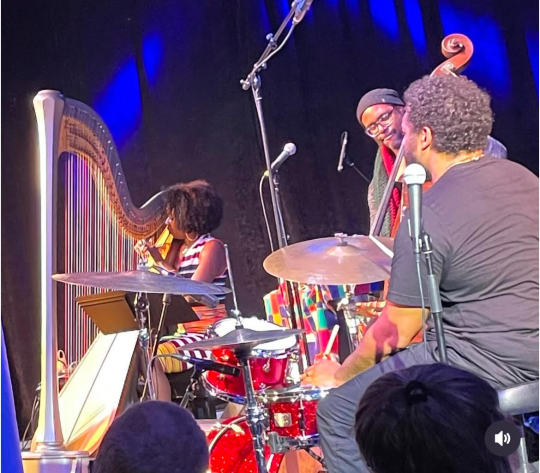
Makaya McCraven and friends
Now let’s jump ahead to May and the always remarkable Thing in the Spring, where Myriam Gendron (with Jim White and Marisa Anderson), Mark Ribot, Earth and many others visited Keene, NH. Wadada Leo Smith played an astonishing set with Shazad Ismaily…even more astonishing, he had to yell at the crowd for quiet.
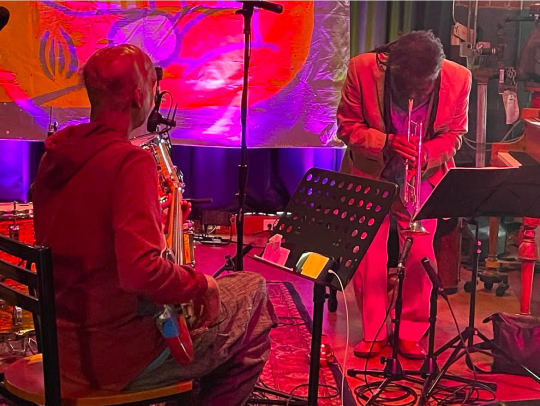
I even had the chance to see a couple of bands that rarely play live. In August, my friend Chris Liberato booked the super-ish group Winged Wheel to play at a nondescript bar near Springfield Mass. It was revelatory, worth getting lost trying to find 91 in the middle of the night afterwards.
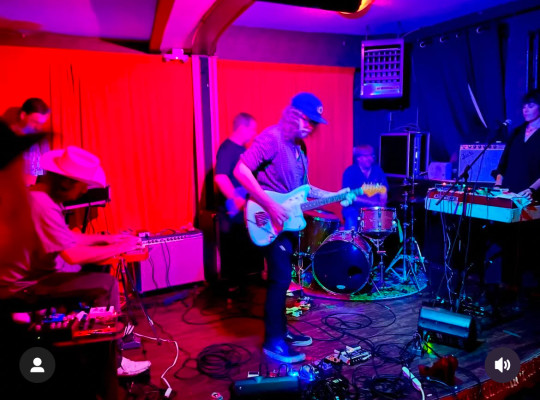
Winged Wheel
Then in November, right around the time, things started getting dark, I hit the lottery. First Haley Fohr and Bill Nace raised the spirits in Keene, a day later the NYC post-punk legends Love Child with Lupo Citta in Easthampton, and a couple of days after that, Ben Chasney and Tashi Dorji in Brattleboro in front of the towering pipe organ at Epsilon Spires.
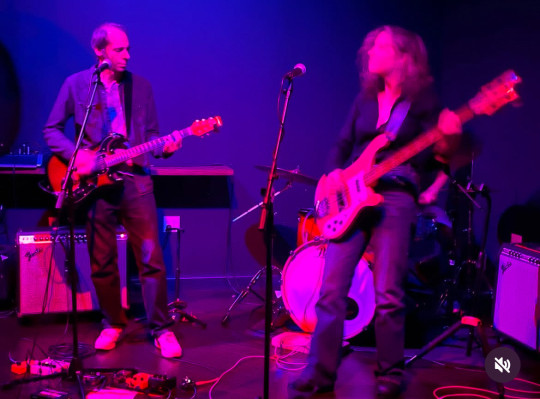
Love Child
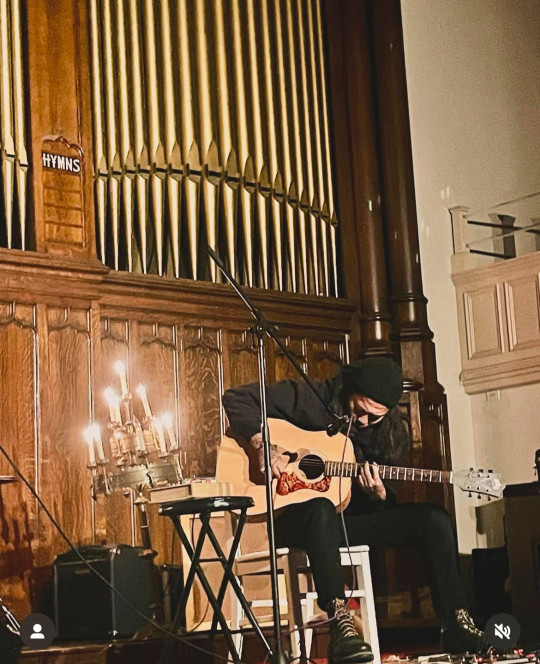
Tashi Dorji
Recorded music came in an avalanche in 2024, just so many good records, month after month after month. I narrowed my favorites down to a list of 42, harder than you’d think, and there are plenty of discs I enjoyed plenty that didn’t make the cut.
Top Ten
Rosali—Bite Down (Merge) My favorite all year long for Rosali’s lovely voice, the instant classic-ness of the songs and the kicking band in Mowed Sound.
Nick Cave & the Bad Seeds—Wild God (PIAS) What I’d really like is another Grinderman, but this lush, string-heavy iteration of the Cave art form is very fine in its own way, not least because it leans on the Bad Seeds more heavily than the last couple. Time for joy indeed.
The Cure—Songs for a Lost World (Polydor) It is not easy to crack my top five in November, but Robert Smith did it with the bleak, soul-stirring grandeur of this late-life epic. It doesn’t hurt that he still sounds exactly like he did in my misspent youth.
Oneida—Expensive Air (Joyful Noise) Oneida has been my favorite working band for decades, and this one follows the song-structured Success with more bangers but also more weirdness. Thalia Zedek sings on two tracks with her signature ragged power.
Miriam Gendron—Mayday (Thrill Jockey) These are just surpassingly beautiful songs about love and death, gorgeously played and sung. Gendron continues to get more comfortable with her art, taking a few more well-worth-it steps from her folk music origins.
PYPY—Sacred Times (Goner) Unhinged post-punk from one of the best in Montreal’s thriving scene. “Lonely Striped Sock” crosses ESG with Delta Five and contains the craziest keyboard lick I’ve heard this year.
MJ Lenderman—Manning Fireworks (ANTI-) One of 2024’s consensus favorites, and for all that, more idiosyncratic and complicated than you’d expect. Genuinely intriguing writing coupled with an incendiary rock roar.
Cassandra Jenkins—My Light My Destroyer (Dead Oceans) A bigger, denser, more accomplished sound for Jenkins than on her magical debut, but no less quirkily intelligent for its beauty.
Mdou Moctar—Funeral for Justice (Matador) Mdou Moctar is maybe the best guitarist in rock music right now, and here’s the kicker, he’s not really in rock music. Searing, wrenching, politically charged Afro-rock from the master.
Another Dancer—I Try to Be Another Dancer (Bruit Direct Disques) This charmingly odd Brussels ensemble skips from detuned Lewsberg-style minimalism to glowing Stereolab raves. Unexpected and intoxicating.
The rest
Winged Wheel—Big Hotel (12XU)
Uranium Club—Infants Under the Bulb (Static Shock)
E—Living Waters (Silver Rocket)
Luppo Citta—S-T (12XU)
Six Organs—Time Is Glass (Drag City)
Des Demonas—Apocalyptic Boom Boom (In the Red)
Guided by Voices—Strut of Kings (GBV Inc.)
Weak Signal—Fine (12XU)
Bonnie “Prince” Billy—Hear the Children/The Evidence (No Quarter)
Yasmin Williams—Acadia (Nonesuch)
Bill Mackay—Locust Land (Drag City)
Hard Quartet—S-T (matador)
The Bug Club—On the Intricate Inner Workings of the System (Sub Pop)
Black Pus—Terrestrial Seethings (Thrill Jockey)
Dummy—Free Energy (Trouble in Mind)
Horse Jumper of Love—Disaster Trick (Run for Cover)
Itasca—Imitation of War (Paradise of Bachelors)
West of Roan—Queen of Eyes (Spinster)
James Elkington & Nathan Salsburg—All Gist (Paradise of Bachelors)
Workers Comp—S-T (Ever/Never)
Jessica Pratt—Here in the Pitch (Mexican Summer)
Aluminum—Fully Beat (felte)
Mary Timony—Untame the Tiger (Merge)
Mount Eerie—Night Palace (P.W. Elverum & Sun)
Penny Arcade—Backwater Collage (Tapete)
Rail Band—S-T (Mississippi)
The Softies—The Bed I Made (Father/Daughter)
Thine Retail Simps—Strike Gold Strike Back Strike Out (Total Punk)
Unknowns—East Coast Low (Drunken Sailor)
Ava Mendoza—Circular Train (Palilia)
Ned Collette—Our Other History (ever/never)
Amelia Courthouse—broken things (Spinster)
The Osees—Sorc 80 (Castle Face)
#yearend 2024#jennifer kelly#dusted magazine#makaya mccraven#ben chasny#wadada leo smith#shazad ismaily#rosali#nick cave and the bad seeds#the cure#oneida#myriam gendron#pypy#mj lenderman#cassandra jenkins#mdou moctar#another dancer
15 notes
·
View notes
Text
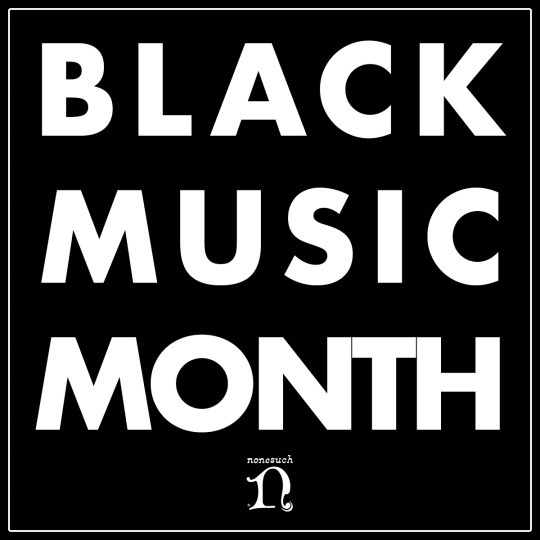
Happy Juneteenth! Check out our Black Music Month playlist of new and classic Nonesuch recordings by Rhiannon Giddens, Cécile McLorin Salvant, Vagabon, Ambrose Akinmusire, Davóne Tines, Julia Bullock, Nathalie Joachim, Makaya McCraven, Yussef Dayes, Lianne La Havas, Yasmin Williams, Jeff Parker, Allen Toussaint, and more. You can hear it here.
#black music month#rhiannon giddens#cecile mclorin salvant#vagabon#ambrose akinmusire#davone tines#julia bullock#nathalie joachim#yussef dayes#lianne la havas#yasmin williams#jeff parker#allen toussaint#makaya mccraven#nonesuch#nonesuch records
1 note
·
View note
Text
Makaya McCraven - In These Times (Live on KEXP)
youtube
Makaya McCraven performing “In These Times” live in the KEXP studio. Recorded October 25, 2022.
Makaya McCraven - Drums
Junius Paul - Bass
Jeff Parker - Guitar
De’Sean Jones - Saxophone / Flute / EWI
1 note
·
View note
Text
Magic Carpet - Broken Compass - RIYL Bill Laswell's world fusion productions
Magic Carpet came together for this purpose years ago, some twenty summers and falls. At the core, six guys from diverse musical and cultural backgrounds, who set out to perform various traditions, bring old sounds into now, music enabling rapid travel. Maybe as an educational project? Perhaps, but also a weekly gig at an Ethiopian restaurant in Chicago. Over time they came to know each other musically, lock in, and their sounds flowed joyously through house parties, block parties, street festivals. One long weekend about seven years ago, Magic Carpet all had some time together in Chicago's Bel Air Sound Studio, and recorded the grooviest, loveliest, soulfullest, chillest set of tunes in the world. The rhythm section of Parrish Hicks (bass), Makaya McCraven (kit), and Ryan Mayer (percussion) unfolds hypnotic tales while Fred Jackson's soprano sax dances, Temuel Bey's guitar trances and Teddy Aklilu's keys fill the zone. The tunes wear different masks, from straight-up funk ("Aum U Wah") through smooth jazz-inflected bliss ("Flow"), to the West African grunge of "Touareg Fever" and "Rumba Gnawa". Broken Compass is Magic Carpet's first widely-distributed recording, and it documents the band at the peak of their first stage, before Parrish Hicks's transition in 2017. Since then, the group has continued to evolve, more recently adding vocalist and dancer Tracy King to their lineup. Those in Chicago who know, know, and now you know too. Magic Carpet's light shines. Magic Carpet on this recording: Parrish Hicks bass Timuel Bey guitar Ryan Mayer percussion Makaya McCraven drums Tewodros Aklilu keyboard Fred Jackson Jr saxophones, small percussion Kaliq Woods clarinet Artwork concept by Fred Jackson Jr. Ink drawing by Stephanie Pierce Design and layout by Leticia Arioli In memory of Parrish Hicks.
3 notes
·
View notes
Text

Daniel Villareal - Saint Vincent Hotel Courtyard, New Orleans, Louisiana, April 27, 2023
Last week, I was lucky enough to catch the Denver kickoff date of Daniel Villareal's current U.S. tour — in fact I was seated so close to the Panamanian / Chicagoan drummer that I had to push my chair back to snap the above pic. After falling in love with his two recent International Anthem LPs, it was a blast to be totally immersed in Villareal's intoxicating rhythms, and his band was on fire throughout the set. They've got a few upcoming dates this month on the east coast; I highly recommend you check 'em out if you can.
If you can't, here's a little something to tide you over — a very nice FunkIt video of Villareal and co. (the same group he's touring with now, I believe) a few years back in the Big Easy (hey, it's Mardi Gras this week, right?). And if you know what's good for you, you'll also check out the recording of Jeff Parker and Makaya McCraven from the same night; the duo's closing rendition of Ornette's "Lonely Woman" is absolutely killer.
1 note
·
View note
Text
A Stacked Lineup Delivers a Knockout Night of Jazz at Music Hall of Williamsburg
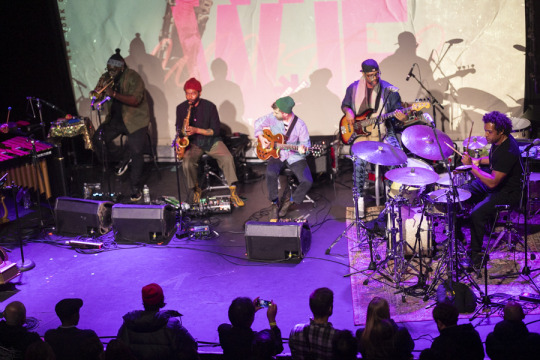
Winter Jazzfest Brooklyn Marathon – Music Hall of Williamsburg – January 11, 2025
Winter Jazzfest is now in its 21st year (!) in New York City and as ever, it is both a kaleidoscope and a panorama, not to mention also a sampler’s buffet. With more than 100 groups of virtually every stripe of modern jazz playing a big handful of venues in two boroughs over the course of a week, it’s impossible to catch full or even partial sets of everything, and that’s sort of the point: You make a loose plan for the acts you’d like to experience, you note some curiosities and then almost without effort — even if you follow the plan — you still stumble on something you didn’t know, weren’t expecting and won’t soon forget. It’s a magical sort of only-here festival made extra special by the fact that much of January is live-music wilderness for just about anywhere else in the country.
My slice of Winter Jazzfest 2025 took me to Brooklyn on Saturday, and specifically to Music Hall of Williamsburg, where, posted up over six hours, I absorbed big slabs of the Saturday “marathon” show: Four acts, back-to-back, with duck-outs lightly possible to eight other nearby venues, most within walking distance, if so inclined.
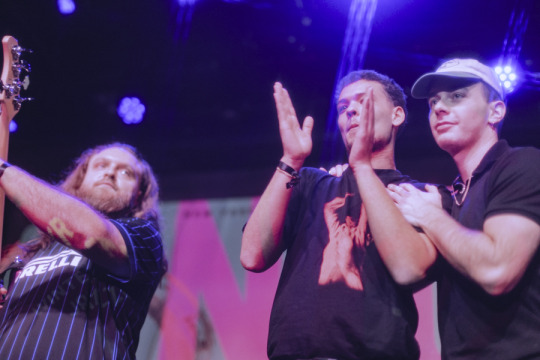
But the choose-your-own-adventure style of Winter Jazzfest would have been well served for anyone spending their adventure just here. First up was the Moses Yoofee Trio, from Germany, playing as part of their first-ever Stateside run of shows. This was the psychedelic groovy goods, as Yoofee — an inventive keyboardist — served up what felt like every manner of synth and electric-piano sounds dappled across a saddle-taut pocket from Roman Klobe-Baranga and Noah Fürbringer. The compositions felt slippery enough that they could dissolve at any moment into free improv, but they were at their best right at the edges of where that dissolution could occur, pulling things back as they fired knowing chuckles at one another, well in control the whole time, loving the tension of how the songs pushed and shoved at their natural edges.
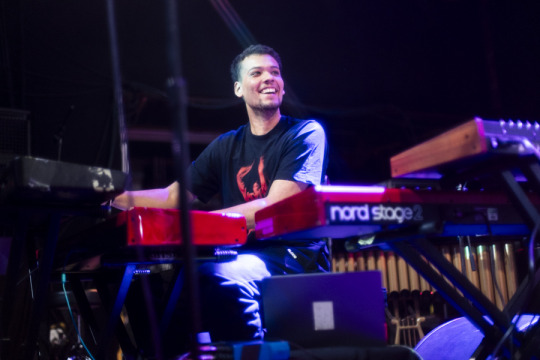
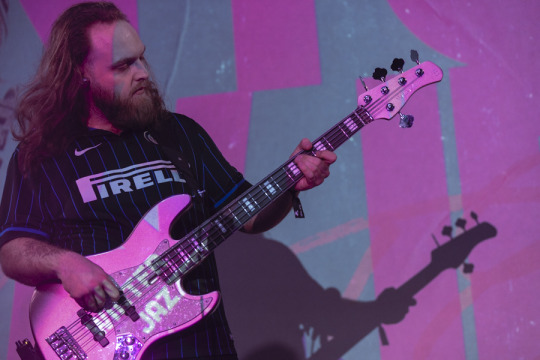
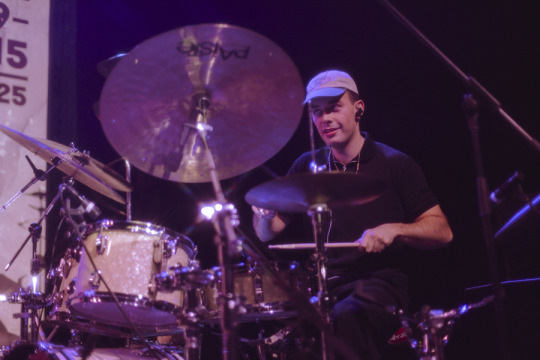
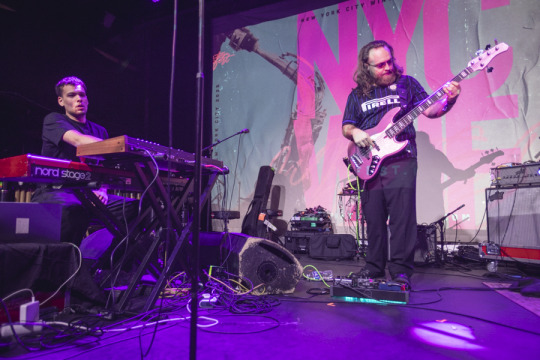
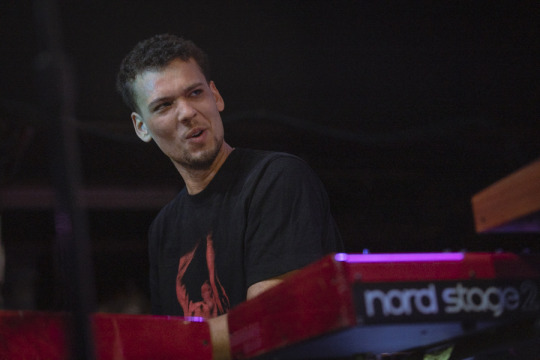
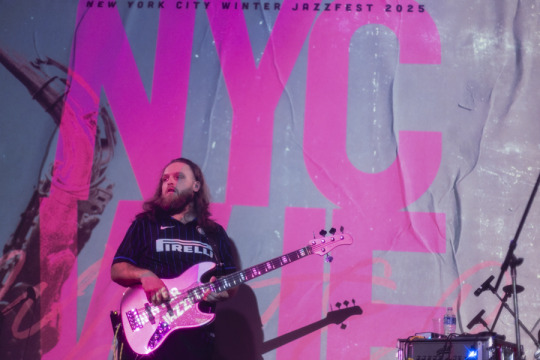
Next came the mesmerizing singer Arooj Aftab, who focused during her hour on compositions from 2024’s Night Rein album and was completely transporting, using soundscapes that were equal parts lush and haunting, frequently yielding to a killer band that included renowned harpist Maeve Gilchrist and featured the collective swell of harp, bass, guitar, drums, flute surrounding the audience as the solemn intensity of Aftab’s own singing held the sonics together.
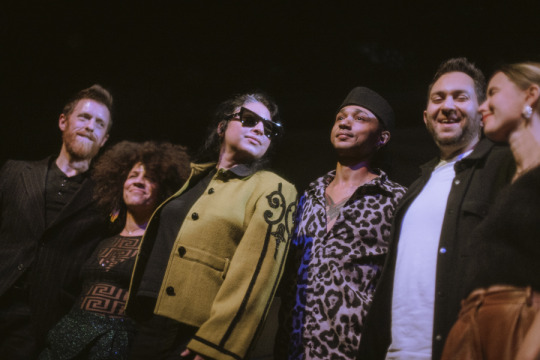

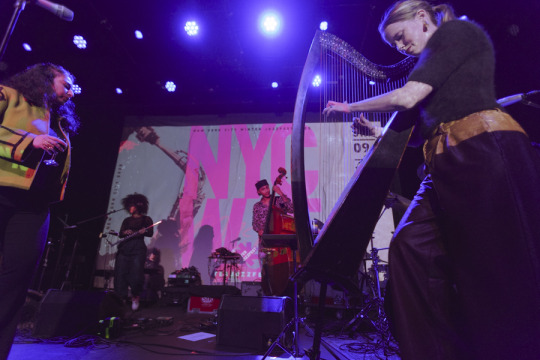
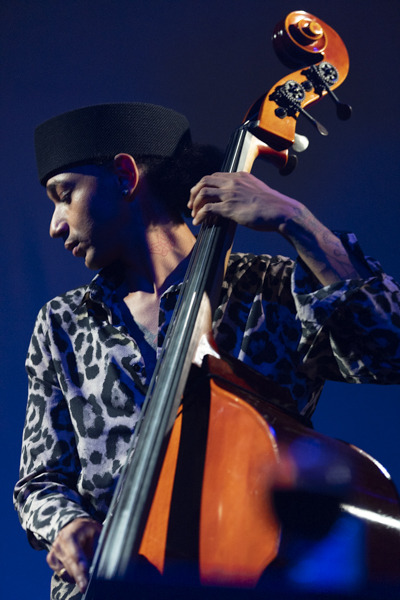
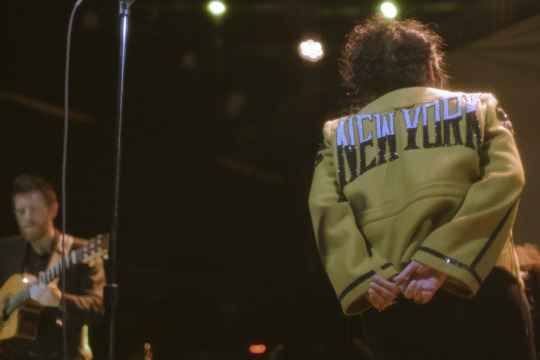



SML, or “Small Medium Large”, a new-ish West Coast collective, are lauded as something of a supergroup based on the various members’ lineages. But as a quintet, they avoid the polite yielding so often true of a band of aces that doesn’t want any one member to overshadow another and just friggin’ go for it — they were at their best doing a more-is-more thing on various interstellar journeys, leaving with a feeling of having just gotten started when their hour concluded, and also delivering a set that felt full. Saxophonist Josh Johnson was an especially potent standout, sending a frequent sax-sonics ripple across the music like a whipping tentacle.
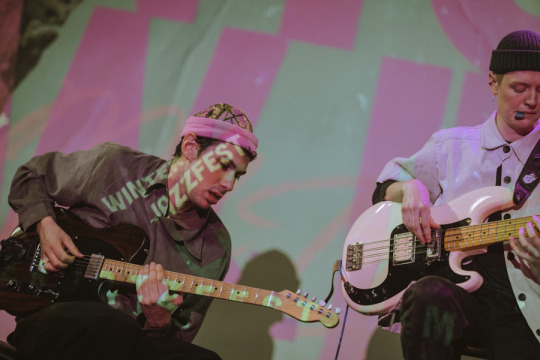
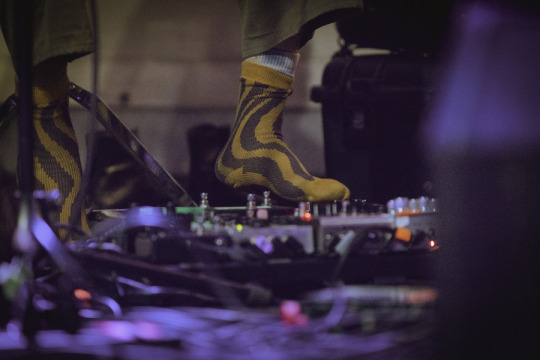
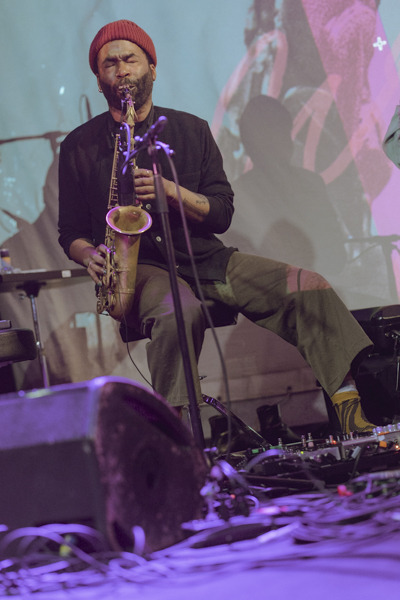
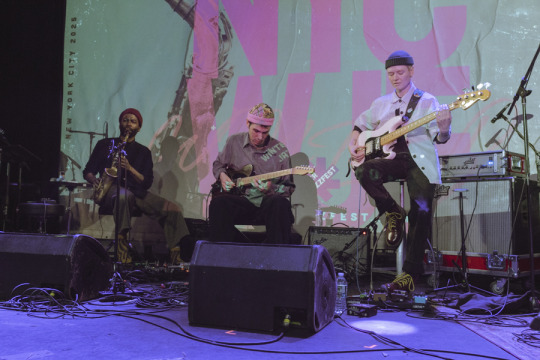
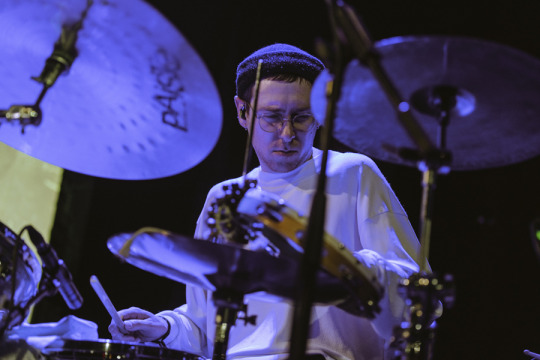
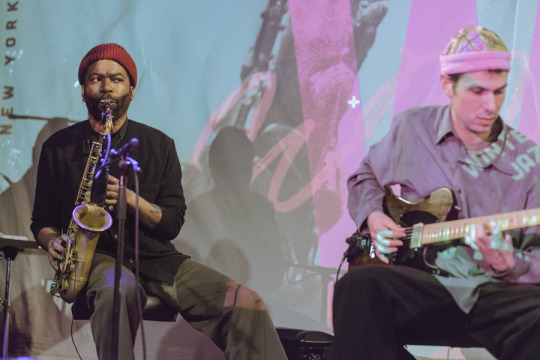
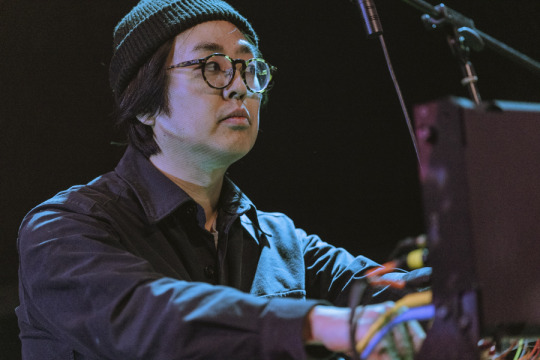
By the time drummer Makaya McCraven, the 2025 Winter Jazzfest artist in residence, got rolling just after midnight, it was a coolly competent closer, not feeling like the headlining set. That wasn’t for trying — McCraven was fantastic— but so well-rounded was this lineup — newcomers, established titans, a wild, brain-bending mixture of styles and approaches —that you almost weren’t even wondering what else you might have missed at other venues. Almost. —Chad Berndtson | @cberndtson
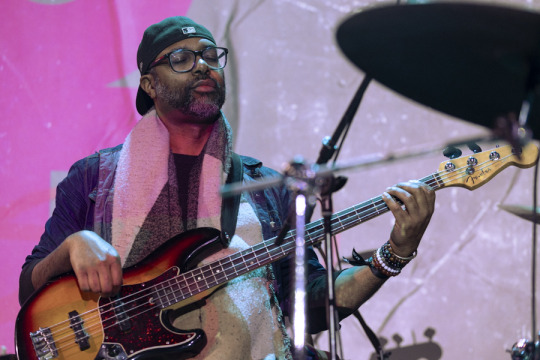
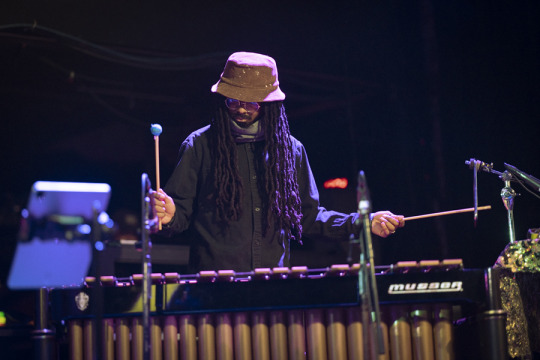
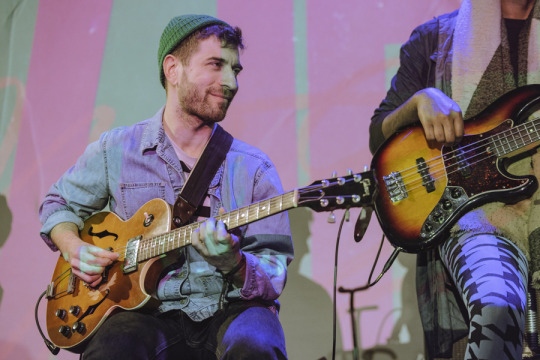
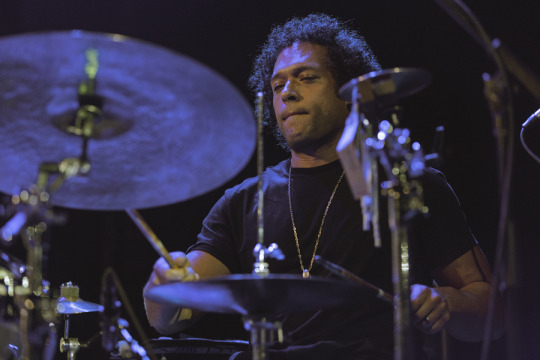
Photos courtesy of Silvia Saponaro | @silvia_saponaro
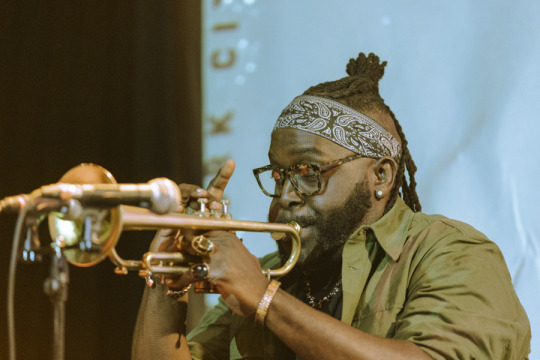
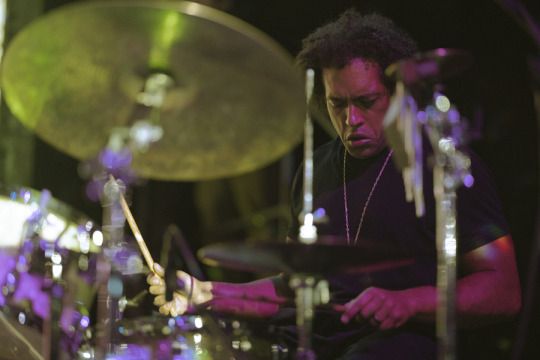
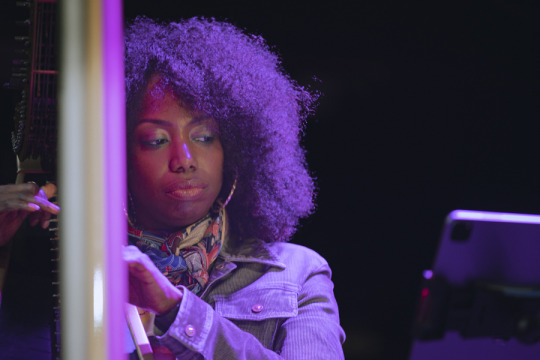
@silvialovesmusic
#Arooj Aftab#Bowery Presents#Brooklyn#Chad Berndtson#Josh Johnson#Live Music#Maeve Gilchrist#Makaya McCraven#Moses Yoofee Trio#Music#Music Hall of Williamsburg#New York City#Night Rein#Noah Fürbringer#Photos#Review#Roman Klobe-Baranga#Silvia Saponaro#Small Medium Large#SML#Williamsburg#Winter Jazzfest
1 note
·
View note
Text
Anna Butterss Interview: Los Angeles in 2024
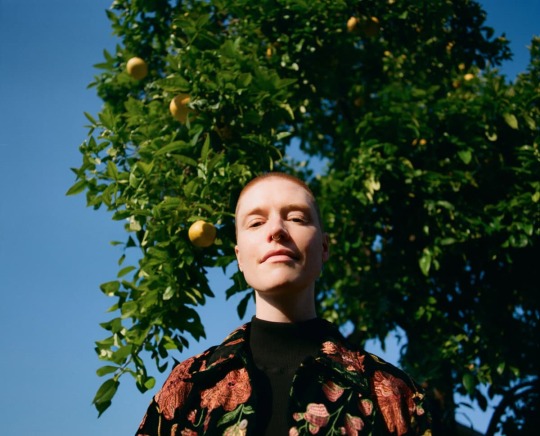
Photo by Samantha Lee
BY JORDAN MAINZER
For much of their career, bassist Anna Butterss has constructed bridges between musical worlds. The classically trained Australian musician moved to Los Angeles a decade ago, not too long after beloved experimental guitarist Jeff Parker relocated there. Like the versatile Parker, who has made his mark in both the jazz and post-rock worlds, Butterss quickly became an in-demand player in the jazz and indie rock spheres, both as a session and touring musician. Shortly after moving, Butterss connected with Parker, joining his now long-running quartet, alongside saxophonist Josh Johnson and drummer Jay Bellerose. (I first heard Butterss' nimble work on Makaya McCraven's landmark 2018 album Universal Beings.) At the same time, Butterss, always on the periphery of hyped indie music through their friends, found themselves alongside Aughts stalwarts Jenny Lewis and Andrew Bird and then-up-and-comers like Phoebe Bridgers. Over the past five years, Butterss has buoyed career reinventions and risen alongside their peers.
2024, then, feels like the first year where Butterss is moving to the forefront. Though they released their debut album Activities and helped Parker immortalize the Enfield Tennis Academy in 2022, this time, over the span of a mere six months, they've been a part of three major improvisational jazz records. First, Butterss is one-fifth of SML, who I profiled earlier this year after their debut record release in June. SML Songs like "Industry" showcased Butterss' ability to steadily drive a track alongside freewheeling bandmates, while "Dolphin Language" gave them a turn to have fun splintering. The quintet played two sets at the inaugural Warm Love Cool Dreams festival at the Salt Shed in September, one performing material from Small Medium Large, the other backing Jamaican dancehall DJ and singer Sister Nancy.
Butterss delves deeper into the world of grooves on the just-released new Jeff Parker ETA IVtet album The Way Out of Easy, a follow-up recording to Mondays at the Enfield Tennis Academy. Like the latter, The Way Out of Easy was recorded at the ETA and mixed live by engineer Bryce Gonzales, on a night in January 2023. The four longform tracks that make up the record are certainly opportunities for Parker and Johnson's expressions, but don't discount Butterss' understated and underrated adaptability. Throughout "Freakadelic", an extended version of a long-time Parker composition, Butterss and Bellerose provide a hip-hop groove underneath Parker's prickly and sinuous lines, only to wake up a little bit as Johnson's saxophone whirrs and hypnotizes. Butterss mirrors Johnson's rounded mournfulness on the otherwise beatific "Late Autumn", while on "Easy Way Out", they emulate Parker's slow cascades, a perfect contrast to Johnson and Bellerose's expressiveness. Of course, closer "Chrome Dome" ends up a blissed out dub song, Butterss once again a masterfully stable counterpart to Johnson's garbled notes and Bellerose's polyrhythms.
It's clear, then, that all of Butterss' experiences informed their second solo album and International Anthem debut, Mighty Vertebrate, released last month. In early 2023, Butterss found themselves wanting to create while balancing their busy schedule. In order to force themselves to write freely without succumbing to their own judgements and internal monologue, Butterss adopted constraints similar to Brian Eno's Oblique Strategies. "Pokemans", for instance, arose from the goal to use the bass in a way that belies the instrument's typical role. But Butterss was careful not to let Mighty Vertebrate be an album solely reflective of its process, and it sounds loose. They created the stems of the songs before fleshing them out with percussionist Ben Lumsdaine; at that point, the songs were ready for tracking at Chris Schlarb's BIG EGO with Johnson and another SML bandmate, Gregory Uhlmann. As a result, Mighty Vertebrate is diverse and extensive. "Ella" creates a world out of a two-note guitar line and saxophone processed through a synthesizer. "Lubbock" juxtaposes wiry guitar and swirling woodwinds atop raining percussion. "Saturno"'s warped bells give way to a percussion and saxophone groove, Butterss leading the evolution into a rich tapestry. Standout track "Dance Steve" mashes up Malian desert blues and synth punk, a collage of samples, syncopated 808s, synths, and in a full circle moment, a Jeff Parker guitar solo. Perhaps most impressive is that Mighty Vertebrate is cohesive through natural patterns that emerged throughout its creation, Butterss paring its songs down before building them back up, just like on their work with SML and Parker.
In September, a week before the album's release and just before SML's sets at Warm Love Cool Dreams, Butterss did get to try out Mighty Vertebrate songs live with their band at Marz Brewing. They then played a proper record release show in Los Angeles at 2220 Arts + Archives, the day the album came out digitally and on vinyl. A few days later, I spoke to Butterss over Zoom about the making of Mighty Vertebrate, the L.A. scene and International Anthem, post-rock, album and song title meanings, and misheard lyrics. Next week, starting on Monday, Butterss will take a victory lap to celebrate their stellar year, playing in a three-night International Anthem residency at Public Records in Brooklyn: with Jeff Parker ETA IVtet, SML, and their band. It's safe to say you'll be continuing to hear Butterss' name a lot for the next several years. Not only is SML set to return in 2025 and Butterss working on their next record, but they've been a full time member of none other than Jason Isbell & the 400 Unit for a year. Add the Americana/alt-country genre to the list of worlds among which Butterss has built connections.
Read our conversation below, edited for length and clarity.
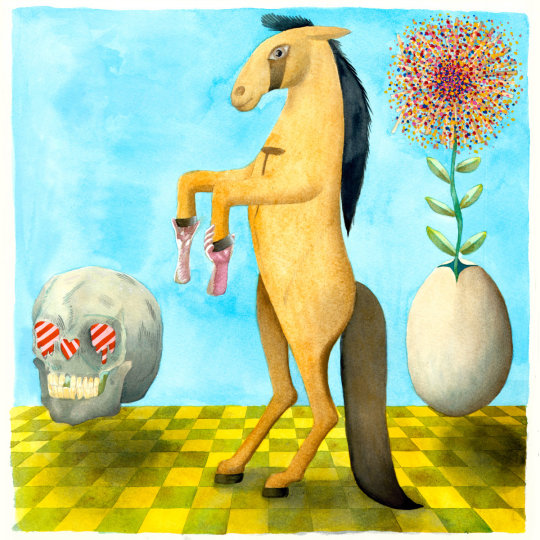
Since I Left You: Why did you decide to make a record using Oblique Strategies-inspired tactics? Was it out of necessity, or was it something you always wanted to do?
Anna Butterss: It's the former for sure. Writing music, I enjoy doing it, but I also find it very hard, because I'm incredibly judgmental, and it's hard for me to think in the moment and follow an idea without already judging it. I'm like this with other things as well. I've always practiced the bass with these very specific restrictions in mind, very structured, so this was a way to get myself to be creative.
I started writing music that way a few years ago. It was a little challenge to myself called "one-hour beats," which is exactly what it sounds like. [laughs] How much of a beat can you make in one hour? If it's bad, if you don't like it, you've only spent an hour and have probably learned something. I started [Mighty Vertebrate] off like that. I spent a lot of time working on the music, but I'd go back and open up one of the ideas and ask, "Is this one cool?" I'd work on that one for an hour or two hours and put it away. I spent the whole year doing that.
SILY: Did you ever fully stray from your initial goal? Or were the finished songs pretty faithful to their original restrictions?
AB: I strayed away. The restrictions were a means to an end, to get something written. Once you get an idea down, it's much easier to manipulate it and try different things, but getting an idea down firstly is the hardest part. Once I felt like I had a strong or compelling idea, I'd let myself do whatever I needed to do. If I was having a good time working on something, I wouldn't put more restrictions on it.
SILY: What ties all of these songs together? Is it the process you used to make them?
AB: Hmm...that's a good question. It's a pretty eclectic record. I think the thing that ties them together for me is that they're songs I wrote during a period of my life, during 2023. A lot of them have similar sonic tendencies, a lot of guitars because it's an instrument I can kind of play, and drum machine. But the thing that ties them together is emotionally how I was experiencing that year. With the band, we all play together a particular way, and that ties them together, too. If I listen back to them, I can hear melodic tendencies I have and forms I gravitate towards, but I wasn't trying too hard to push them all into the same zone.
SILY: At what point did you bring in the band in the process of making Mighty Vertebrate?
AB: Quite late. I brought in [co-producer] Ben Lumsdaine...almost a year after we started writing it. I tried to get as much of it done by myself as I could. I had demos that were in pretty good shape. All the parts were there, but I wasn't trying too hard to get quality recordings. Some of the songs don't have a live band on them, like "Bishop" or "Dance Steve". Ben and I worked on them a lot. We tracked drums, bass, and more guitars. The other two guys in the band, I wrote charts for everything and we rehearsed one time and recorded in the studio for two days. Ben and I did some more overdubs, and that was it.
SILY: The songs on the album that do have a live band don't sound too different from the ones that don't have a live band. That is, if you were to listen to the album without paying the utmost attention, you might not necessarily realize which songs had a band and which didn't. There's an abstraction to the aesthetic. Was that something you were going for?
AB: In a way, yes. I had experimented a little bit on Activities with blending live drums, and we did synths with live bass. I had that in mind when I was making the record. Also, the fact that you have Greg playing guitar on some of the tracks, me playing on some of them, Jeff playing on some of them, Ben playing on some of them, it blurs the lines. Both Greg and Josh use effects in an organic way when they're playing, so it gets blurred a bit in a way I find pleasing. I wanted it to be its own world, not just an acoustic jazz record or an electronic record. I wanted it to live in a between space.
SILY: Do you think the individual musicians' playing styles started to blend, too? For instance, there were some guitar solos that sounded like Jeff Parker that might not have been Jeff Parker.
AB: Definitely. Jeff's been a big influence on the four of us, for sure. We've all played with him, and when I started messing around with the guitar, I thought, "Oh, this is just me sounding like a very cheap version of Jeff," because that's the guitarist I listen to the most. I think I sound a little less like him on the guitar now. Playing together for a really long time in different combinations, there's a shared language, sonic world, and tendencies. I hope other people hear this record and think, "This sounds like something that came out of Los Angeles in 2024." I like records where we can still have that sense of place, even though we're making music in such a globalized way. I feel like we have a little scene in Los Angeles that has a distinctive sound.
SILY: Certainly. The International Anthem family, while based in Chicago, has so many artists who are based in L.A. There's also the Enfield Tennis Academy and its branches. It's like one of the last remaining active scenes.
AB: [laughs] I hope not! It's definitely an International Anthem-sounding record as well. Greg's from Chicago, Josh grew up near Chicago, Jeff spent a lot of time in Chicago, and Ben, Josh, and I all went to school in Indiana, so we have a strong Midwest connection.
SILY: Where did the vocals on "Breadrich" come from?
AB: The ones that are a little sing-song are me. It's [inspired by] a character from a Mexican TV series called La Casa de las Flores, a Netflix series I've watched about three times during the pandemic. It's like a telenovela, but it's very modern and revolves around a lot of drag queens. There are trans people and bisexual main characters, but it's also a telenovela, so it's very dramatic and the plotlines are kind of ridiculous. One of the main characters, Paulina de la Mora, is kind of iconic and has an iconic way of speaking. I was also listening to a lot of Madlib and MF Doom, and MF Doom has so many cartoon and comic elements, so "Breadrich" was my hint at that, with me reimagining what it would be like if [Paulina de la Mora] had a spinoff.
I got into hip hop...in my 20's, having come from a very jazz background. It fascinates me and I love it. I'm not super directly hip hop-influenced, but it's something I think about a lot when working on things.
SILY: I was going to ask, since you collaborated on this record with John Herndon on the video for "Pokemans" and the album art, whether you were influenced by any of his A Grape Dope material.
AB: Not directly. Also, I get a ton of Tortoise comparisons, and I get why, but I really tried to steer clear of listening to that type of music when I was making this record because I didn't want it to sound too derivative. But I love John and am happy he did such great art for the record.
SILY: The Chicago post-rock connection to this current wave of jazz is palpable, because Chicago jazz preceded Chicago post-rock.
AB: Definitely. I've spent a fair amount of time in Chicago but have never lived there. I'm listening to all these records 10-20 years after they came out, so I'm getting a picture and sense of it. I also play a lot with Jeff and am close with people who have been involved in those scenes, so I'm getting a secondhand version of it. But I think it's cool that music that's been around for a while is still very relevant and current sounding.
SILY: How did you come up with the track titles on Mighty Vertebrate?
AB: "Bishop", my grandfather was a bishop. [laughs] What else do we have? "Dance Steve", I put a dance beat under a sample I thought sounded like Steve Reich. It was stuff like that. I do have a note in my phone where I collect phrases people will say, if they sound interesting, which is where "Breadrich" came from. My partner said that we were "bread-rich" after a friend gave us a bunch of bread, which I thought was funny.
SILY: It can be somewhat of a Rorschach test. Some of the titles on Small Medium Large were working titles or joke titles that ended up being perfect. It adds a levity to the project.
AB: I remember talking with Greg when trying to come up with titles and being like, "It's hard to come up with song titles that are original," and he was just like, "Oh, don't worry about that. There will always be another song [that shares a title.]" I don't think it matters that much. The record title, more so. But at the end of the day, it's instrumental music. It's already pretty abstract, and I want people to be able to have their own experience with it, instead of saying, say, "'Seeing You' is about the time I saw this person." Anyone can interpret it their own way and have their own relationship with it.
SILY: So what's the meaning of the record title to you?
AB: That came from an Andrew Bird lyric I misheard and was singing wrong when I was touring with him. [On Inside Problems' "Stop n’ Shop", it's] supposed to be "Mighty bird of prey," and I didn't realize that until he mentioned it. [laughs] I think it's evocative of a lot of different things. It can be a made-up or fantastical creature, or a way of describing humanity or the dichotomy of humans being so powerful but at the end of the day, vertebrates who will die just like everything else. There's an element of that. It doesn't mean one specific thing to me. I like that it's open-ended.
SILY: The fact that it came from something misheard, but still makes sense, is cool.
AB: [laughs] Yeah. I tried to convince Bird to change the lyric. He wasn't interested.
SILY: Do you pretty actively listen to new music?
AB: I'm trying to more these days. KCRW's morning program, Morning Becomes Eclectic, plays a lot of different genres, and I listen to that pretty religiously. It's where I find a lot of new music. That's probably where I heard Jenny Lewis. I remember driving on the freeway, hearing it and thinking, "What is that?" It turned out a bunch of my friends played in her band. These days, I'm trying to listen to records right when they come out, because otherwise it gets overwhelming.
SILY: What's your approach to playing the songs on Mighty Vertebrate live?
AB: There's more room for expansion. All of the tracks on the record are pretty short; I like to get in and get out, not have anything excessive. [Live,] there's more improvisation involved. A lot of the songs, the way they're structured, the bass line holds everything together statically, and everything is moving around it. I love that. As a bass player, that's what I want to do. I want to be the center of things and everyone else swirling around on top. I had the easiest time playing it live while demanding a lot of everyone else. [laughs]
SILY: Do you foresee these songs taking new shapes the more you play them?
AB: Definitely. That would be ideal. I don't know how many opportunities I'll get to play them. Unfortunately, it's really hard. Everyone's super busy, and I feel like it needs to be these specific people playing the music, and our schedules are all packed. After our show at Public Records, I'd like to continue to play it live and tour, but I don't know how that would work. I don't feel a need to adhere strictly to what's on the record, because if people want to hear the record, they should listen to the record. That's always been my feeling about it.
SILY: What else is next for you in the short and long term?
AB: Some SML stuff, definitely, in the new year. I'll start thinking about the next record. But right now, I'm trying to get through the rest of this year without having an emotional breakdown. [laughs]
SILY: You're very prolific.
AB: I'm a bass player. It's a blessing and a curse.
SILY: Is there anything you've been listening to, watching, or reading lately that's caught your attention or inspired you?
AB: Let me pull up my listening journal...I've been all over the place. My friends have a band called Twin Talk, [based] in Chicago. It's a great trio. They just put out a new record I've been heavily spinning. It's very beautiful. A lot of Brazilian music. We're reorganizing our record collection, so I've been going back and finding a lot of things. Honestly, it's all over the place. I like starting with my friends' records and going from there. Michael Mayo just put out a great record last week. I feel like a bunch of people put out records when I put out mine. Every Instagram post was about a new record.
#interviews#live picks#anna butterss#nonesuch#international anthem#chris schlarb#big ego#gregory uhlmann#public records#john herndon#mighty vertebrate#samantha lee#jeff parker#josh johnson#jay bellerose#makaya mccraven#universal beings#jenny lewis#andrew bird#phoebe bridgers#activities#enfield tennis academy#sml#warm love cool dreams#the salt shed#small medium large#sister nancy#jeff parker eva ivtet#the way out of easy#mondays at the enfield tennis academy
0 notes
Text
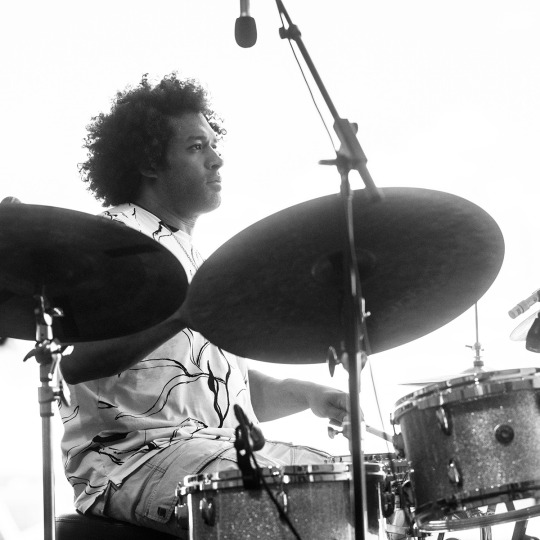
Makaya McCraven is Artist-in-Residence at the 2025 NYC Winter Jazzfest, January 9–14. He has four shows at four venues in four unique combinations, including a performance commemorating the tenth anniversary of his breakout album, In the Moment—an event that will also feature DJ sets by Gilles Peterson. More info and tickets here.
#makaya mccraven#jazz#wnyc#live music#gilles peterson#international anthem#nonesuch#nonesuch records
0 notes
Text
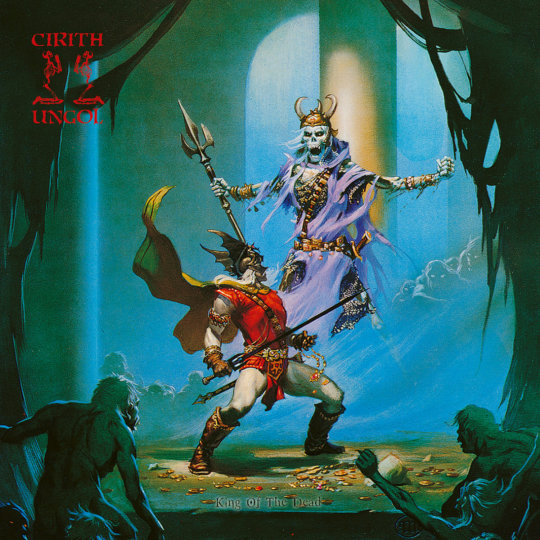
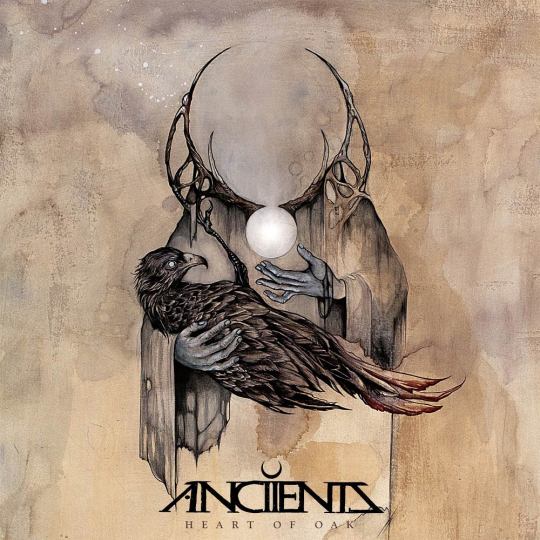
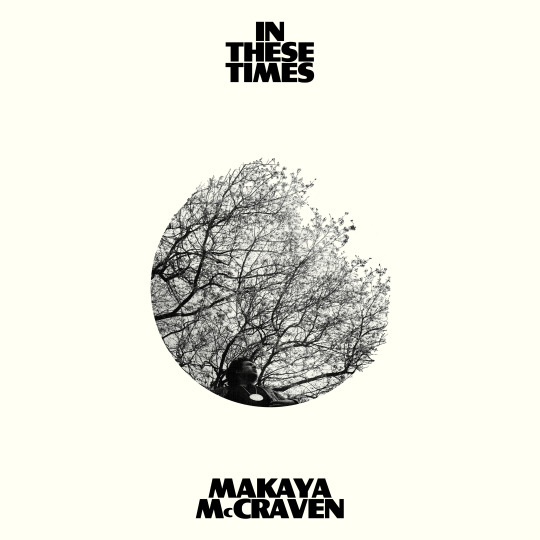
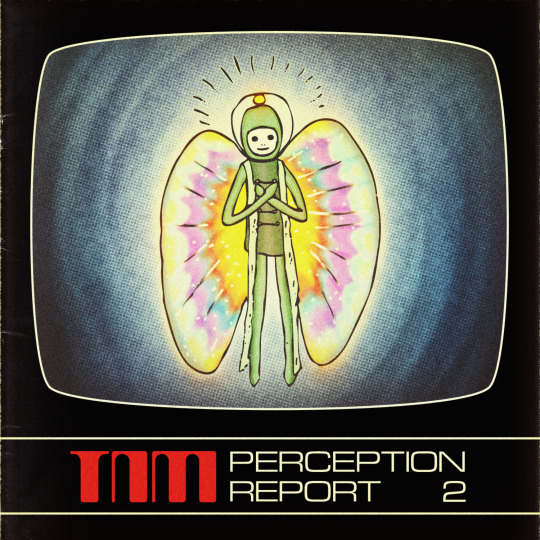
Just some cool album covers, from albums that i like.
King of the Dead, by Cirith Ungol Heart of Oak, by Anciients In These Times, by Makaya McCraven Perception Report 2, by The Night Monitor
0 notes
Text
0 notes
Text
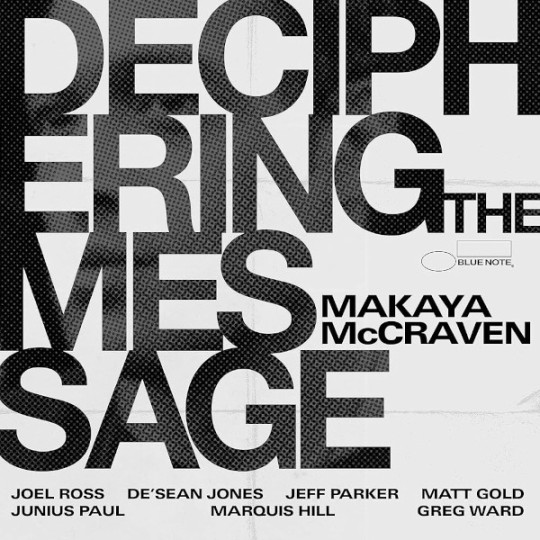
Currently Playing
Makaya McCraven DECIPHERING MESSAGES
0 notes
Text
youtube
I have championed this man will all the gusto inside me for a few years now, but god almighty, this is such a brilliant presentation/composition/arrangement we have here. Oooooh, Nelly.
1 note
·
View note
Audio
"Big Shot City - Makaya McCraven Interpolation" by Interpol, Makaya McCraven https://ift.tt/z2XAgWU
0 notes
Text
@komplikacije tagged me to list my 15 fave artists and my favourite songs by them!! thank you as always <3
no order ofc. this is a bit of an all time list heh
julia holter - maxim's I
mabe fratti - descomposiciones resonantes
sufjan stevens - the predatory wasp of the palisades is out to get us!
pan daijing - act of the empress
the middle east - hunger song
jenny hval - thirst that resembles me (the version with susanna)
toshiyuki miyama & the new herd - 黒塚
l'rain - uncertainty principle
bill callahan - free's
helado negro - pais nubaldo
nina simone - my sweet lord / today is a killer - live at for dix, nj - november 1971
eiko ishibashi - i can feel guily about anything
makaya mccraven - this place that place
earth, wind and fire - in the stone
fiona apple - left alone
taggingggggggggggggg with absolutely zero pressure @demonguts, @taminghorses, @brines and @redp4nda. i just think these are fun!
10 notes
·
View notes
